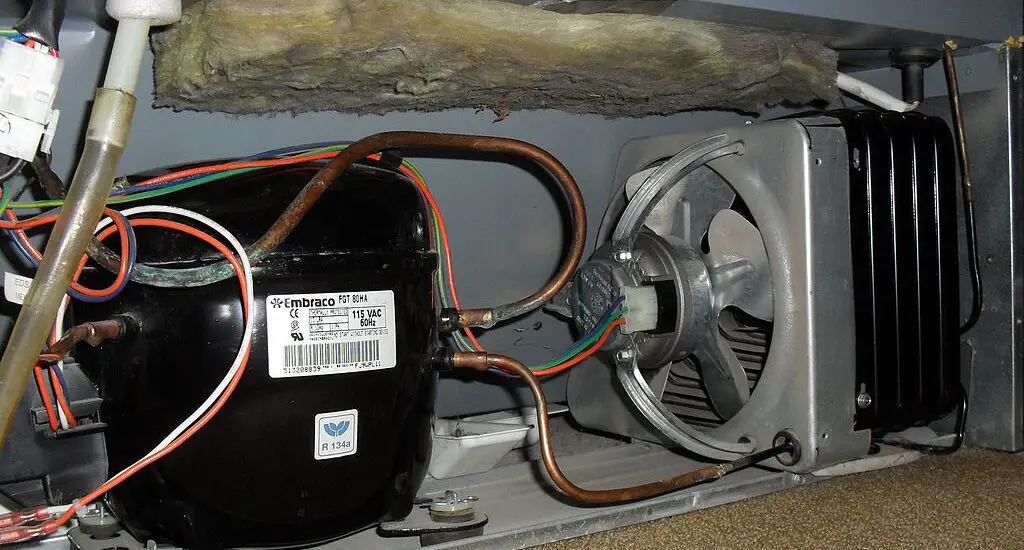Fridge compressor not staying on, you say? Boy, that can be a real pickle, can’t it? It’s like your fridge has turned into a lukewarm, food-spoiling monster. Let’s figure out what’s going on here together, shall we?

Table of Contents
Understanding the Role of a Refrigerator Compressor
So, first things first. You’ve gotta know what a compressor is, right? It’s kind of like the heart of your refrigerator, pumping coolant where it needs to go. It keeps your ice cream frozen and your veggies crisp. It’s a pretty big deal. The compressor is responsible for maintaining the correct temperature inside the fridge.
Function of the Refrigerator Compressor
Think of the fridge compressor as a hard-working bouncer at a busy nightclub. It controls who gets in and out – but instead of dealing with people, it’s managing the flow of refrigerant, the stuff that keeps everything cold. And when it doesn’t stay on? You’re left with a warm fridge and a whole lot of questions. Let’s roll up our sleeves and figure this out, okay?
Check out these other related articles…
Fridge Compressor Pinout: Your In-Depth Guide
Refrigerator 10-Year Compressor Warranty: Ultimate Guide
Fridge Compressor Overload Keeps Tripping: Reasons & Fixes
Refrigerator Compressor Valve: Your Handy Guide
Replacing a Fridge Compressor: Your Detailed Guide
Common Reasons Why a Fridge Compressor Doesn’t Stay On
Now, if your refrigerator compressor is playing up, there could be a few culprits. It’s kind of like a detective story, isn’t it? Let’s examine the usual suspects: overheating, a faulty start relay, and insufficient power supply.
Overheating
Like running a marathon in the Sahara, compressors can overheat if they work too hard. It’s one of the most common reasons why a fridge compressor doesn’t stay on. Let’s look at some tell-tale signs and potential solutions, shall we?
Signs of Overheating
If your fridge is hotter than a summer day in Arizona, that’s a clear sign of overheating. Other signs include the fridge not cooling properly or if it’s making strange noises – kind of like a cat with a bad cough.
Overheating Solutions
Getting your fridge to chill out could be as simple as giving it some space. Fridges need good ventilation, just like us. Ensure that you leave at least a 1-inch gap between the fridge and the wall.
Faulty Start Relay
A start relay’s job is to kick the compressor into gear. It’s like the alarm clock that gets it up and running. When it’s faulty, your fridge compressor might not stay on.
Identifying a Faulty Start Relay
Is your fridge clicking more than a teenager’s smartphone? That’s a sign your start relay might be toast. A surefire way to check is to remove it and shake it. If it rattles, it’s time to get a new one.
Replacing a Faulty Start Relay
Replacing a faulty start relay isn’t too tricky. It’s like swapping out a battery in a remote. You unplug the fridge, remove the old relay, pop in a new one, and voila!
Insufficient Power Supply
Like running a car on fumes, a fridge compressor needs a solid power supply. Without it, the compressor might not stay on.
Signs of an Insufficient Power Supply
If your fridge’s lights are dim or flickering, or your fridge is warmer than it should be, your power supply might be the problem. It’s like having a dimmed stage during a rock concert – not ideal.
How to Improve Power Supply
Improving your power supply might be as simple as unplugging some other appliances. Or, you might need to call an electrician to give your kitchen a power boost. Think of it as giving your fridge a shot of espresso to keep it going.
When to Call a Professional
Now, as fun as it can be to play fridge detective, sometimes it’s best to call in the pros. There’s no shame in it. In fact, sometimes it’s the smartest move.
Dangers of DIY Fixes
While some fridge fixes are doable, others can be dangerous. Tinkering with electrical components, for example, is not for the faint-hearted. So, let’s keep safety first, alright?
Professional Troubleshooting
When a professional troubleshoots your fridge, they’ll do a thorough inspection. They’ll use special tools and their expert knowledge to pinpoint the problem. As Consumer Reports suggests, hiring a pro can be a wise investment.
Maintenance Tips to Prevent Future Issues
With a little TLC, you can help your fridge live a long and cool life. Regularly cleaning the coils and making sure it’s level can go a long way. Consider it preventative care for your fridge.